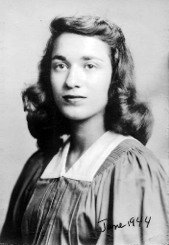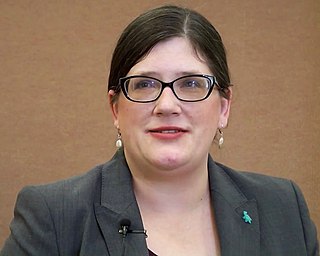Related Research Articles

Title IX is the most commonly used name for the landmark federal civil rights law in the United States that was enacted as part of the Education Amendments of 1972. It prohibits sex-based discrimination in any school or any other education program that receives funding from the federal government. This is Public Law No. 92‑318, 86 Stat. 235, codified at 20 U.S.C. §§ 1681–1688.
Sexual assault is an act in which one intentionally sexually touches another person without that person's consent, or coerces or physically forces a person to engage in a sexual act against their will. It is a form of sexual violence that includes child sexual abuse, groping, rape, drug facilitated sexual assault, and the torture of the person in a sexual manner.
Some victims of rape or other sexual violence incidents are male. It is estimated that approximately one in six men experienced sexual abuse during childhood. Historically, rape was thought to be, and defined as, a crime committed solely against females. This belief is still held in some parts of the world, but rape of males is now commonly criminalized and has been subject to more discussion than in the past.
Sexual misconduct is misconduct of a sexual nature which exists on a spectrum that may include a broad range of sexual behaviors considered unwelcome. This includes conduct considered inappropriate on an individual or societal basis of morality, sexual harassment and/or criminal sexual assault.
Date rape is a form of acquaintance rape and dating violence. The two phrases are often used interchangeably, but date rape specifically refers to a rape in which there has been some sort of romantic or potentially sexual relationship between the two parties. Acquaintance rape also includes rapes in which the victim and perpetrator have been in a non-romantic, non-sexual relationship, for example as co-workers or neighbors.
Rape by gender classifies types of rape by the sex and gender of both the rapist and the victim. This scope includes both rape and sexual assault more generally. Most research indicates that rape affects women disproportionately, with the majority of people convicted being men; however, since the broadening of the definition of rape in 2012 by the FBI, more attention is being given to male rape, including females raping males.

Kimberlé Williams Crenshaw is an American civil rights advocate and a leading scholar of critical race theory. She is a professor at the UCLA School of Law and Columbia Law School, where she specializes in race and gender issues.
The anti-rape movement is a sociopolitical movement which is part of the movement seeking to combat violence against and the abuse of women.
Brenda V. Smith is a law professor at American University's Washington College of Law. She served on the National Prison Rape Elimination Commission.
Rape in the United States is defined by the United States Department of Justice as "Penetration, no matter how slight, of the vagina or anus with any body part or object, or oral penetration by a sex organ of another person, without the consent of the victim." While definitions and terminology of rape vary by jurisdiction in the United States, the FBI revised its definition to eliminate a requirement that the crime involve an element of force.
The City University of New York School of Law is a public law school in New York City. It was founded in 1983 as part of the City University of New York. CUNY School of Law was established as a public interest law school with a curriculum focused on integrating clinical teaching methods within traditional legal studies.
Campus sexual assault is the sexual assault, including rape, of a student while attending an institution of higher learning, such as a college or university. The victims of such assaults are more likely to be female, but any gender can be victimized. Estimates of sexual assault, which vary based on definitions and methodology, generally find that somewhere between 19 and 27% of college women and 6–8% of college men are sexually assaulted during their time in college.

Bernice Resnick Sandler was an American women's rights activist. She is best known for being instrumental in the creation of Title IX, a portion of the Education Amendments of 1972, in conjunction with representatives Edith Green and Patsy Mink and Senator Birch Bayh in the 1970s. She has been called "the Godmother of Title IX" by The New York Times. Sandler wrote extensively about sexual and peer harassment towards women on campus, coining the phrase "the chilly campus climate".
Mary P. Koss is an American Regents' Professor at the University of Arizona, Mel and Enid Zuckerman College of Public Health in Tucson, Arizona. Her best known works have been in the areas of gender-based violence and restorative justice.

Sarah Deer is a Native American lawyer, and a professor of Women, Gender, and Sexuality studies and Public Affairs and Administration at the University of Kansas. She was a 2014 MacArthur fellow and has been inducted into the National Women's Hall of Fame.

2014 was described as a watershed year for women's rights, by newspapers such as The Guardian. It was described as a year in which women's voices acquired greater legitimacy and authority. Time magazine said 2014 "may have been the best year for women since the dawn of time". However, The Huffington Post called it "a bad year for women, but a good year for feminism". San Francisco writer Rebecca Solnit argued that it was "a year of feminist insurrection against male violence" and a "lurch forward" in the history of feminism, and The Guardian said the "globalisation of protest" at violence against women was "groundbreaking", and that social media had enabled a "new version of feminist solidarity".
Janet Elizabeth Halley is an American legal scholar who is the Eli Goldston Professor of Law at Harvard Law School. Her work is influenced by critical legal studies, legal realism and postmodernism.
Rebecca Campbell is a professor of psychology at Michigan State University. She is known for her research pertaining to sexual assault and violence against women and children and the effects of treatment by law enforcement and medical staff on victims' psychological and physiological well-being. Campbell has been involved in criminal justice research on the investigation of Detroit's untested rape kits, wherein DNA evidence obtained in thousands of rape kits was left in storage and not analyzed. She has received numerous awards for her work including the Society for the Psychological Study of Social Issues Louise Kidder Early Career Award (2000), the American Psychological Association (APA) Early Career Award for Distinguished Contributions to Psychology in the Public Interest (2008), the APA Division 27 Council on Educational Program's Excellent Educator Award (2015), and the U.S. Department of Justice Vision 21 Crime Victims Research Award (2015).

Terry M. McGovern is the Senior Associate Dean for Academic and Faculty Affairs at CUNY Graduate School of Public Health & Health Policy in New York City. McGovern is also Professor of Health Policy and Management.
Wendy Murphy is a lawyer specializing in child abuse and interpersonal violence.
References
- ↑ Bronner, Ethan (24 August 2012). "Definition of Rape is Shifting Rapidly". The New York Times . Retrieved 2015-08-17.
- ↑ "M.J. Anderson : CV" (PDF). Law.cuny.edu. Archived from the original (PDF) on 2015-02-26. Retrieved 2015-08-17.
- ↑ "The Great Pretender : Always an Outsider, She Bluffed Her Way Inside a Beauty Pageant; That's When Things Got Ugly". Los Angeles Times. 1988-06-16. Retrieved 2020-09-05.
- ↑ Collins, Lauren. "Miss America's History-Makers and Rule-Breakers". The New Yorker. Retrieved 2020-09-05.
- ↑ Ap (1988-06-16). "Beauty Contestant Denounces the 'Indignities'". The New York Times. ISSN 0362-4331 . Retrieved 2022-05-17.
- ↑ Goldstein, Brandt (2005). Storming the Court: How a Band of Yale Law Students Sued the President-and Won: Brandt Goldstein: 9780743230018: Amazon.com: Books. Scribner. ISBN 0743230019.
- ↑ "Appellate Litigation Clinic — Georgetown Law". Law.georgetown.edu. 2014-10-14. Retrieved 2015-08-17.
- ↑ "City University of New York School of Law at Queens College". Martindale.com. Archived from the original on 2015-09-08. Retrieved 2015-08-17.
- ↑ "Michelle J. Anderson - Faculty Directory". Archived from the original on 2014-10-31. Retrieved 2014-11-03.
- ↑ Altman, Alexa (2012-11-01). "CUNY law school opens in LIC". QueensCourier.com. Retrieved 2015-08-17.
- ↑ "CUNY Law School Will Move To Long Island City | www.qgazette.com | Queens Gazette". www.qgazette.com. 2009-10-21. Retrieved 2015-08-17.
- ↑ "Pipeline to Justice - Social Justice Initiatives - Academics - CUNY School of Law". Law.cuny.edu. Retrieved 2015-08-17.
- ↑ "Incubator for Justice - Community Legal Resource Network - CUNY School of Law". Law.cuny.edu. 2013-09-05. Retrieved 2015-08-17.
- ↑ "Community & Economic Development - Academics - CUNY School of Law". Law.cuny.edu. Retrieved 2015-08-17.
- ↑ "Center for Urban Environmental Reform".
- ↑ CUNY School of Law. "Center on Latino and Latina Rights and Equality".
- ↑ "Sorensen Center for International Peace and Justice - Academics - CUNY School of Law". Law.cuny.edu. 2015-03-06. Retrieved 2015-08-17.
- ↑ "New York City Bar Association - Task Force on New Lawyers in a Changing Profession". Nycbar.org. Retrieved 2015-08-17.
- ↑ "ABA Task Force on the Future of Legal Education" (PDF). Americanbar.org. Retrieved 2015-08-17.
- ↑ "Court Square Law Project".
- ↑ "CrimProf Blog". Lawprofessors.typepad.com. Retrieved 2015-08-17.
- ↑ Yale Law Journal – Campus Sexual Assault Adjudication and Resistance to Reform
- ↑ "Articles: Reviving Resistance in Rape Law - Michelle J. Anderson - Volume 1998 - Number 4 « University of Illinois Law Review". Illinoislawreview.org. Archived from the original on 2015-08-26. Retrieved 2015-08-17.
- ↑ "Archived copy" (PDF). Archived from the original (PDF) on 2017-05-18. Retrieved 2018-09-21.
{{cite web}}: CS1 maint: archived copy as title (link) - ↑ Anderson, Michelle (August 2003). ""Marital Immunity, Intimate Relationships, and Improper Inferences: A N" by Michelle J. Anderson". Working Paper Series. Digitalcommons.law.villanova.edu. Retrieved 2015-08-17.
- 1 2 Michelle J. Anderson. "The Legacy of the Prompt Complaint Requirement, Corroboration Requirement, and Cautionary Instructions on Campus Sexual Assault" (PDF). Ncdsv.org. Archived from the original (PDF) on 2015-09-07. Retrieved 2015-08-17.
- ↑ "NCJRS Abstract - National Criminal Justice Reference Service". Ncjrs.gov. Retrieved 2015-08-17.
- ↑ https://academicworks.cuny.edu/cgi/viewcontent.cgi?referer=https://www.google.com/&httpsredir=1&article=1000&context=cl_pubs [ bare URL PDF ]
- ↑ Michelle J. Anderson (January 2010). ""Sex Education and Rape" by Michelle J. Anderson". Michigan Journal of Gender & Law. 17 (1). Repository.law.umich.edu: 83–110. Retrieved 2015-08-17.
- ↑ Anderson, Michelle J. "1 Georgetown Journal of Gender and the Law 1999-2000 Rape in South Africa". Georgetown Journal of Gender and the Law. 1. Heinonline.org: 789. Retrieved 2015-08-17.
- ↑ Anderson, Michelle (2012-02-02). ""All-American Rape" by Michelle J. Anderson". St. John's Law Review. 79 (3). Scholarship.law.stjohns.edu. Retrieved 2015-08-17.
- ↑ Michelle J. Anderson. "Articles Negotiating Sex" (PDF). Lawreview.usc.edu. Archived from the original (PDF) on 2016-02-05. Retrieved 2015-08-17.
- ↑ "President Anderson's Biography".
- ↑ "Bernie's Back In Brooklyn; Speaks at Brooklyn College Commencement". Bklyner. 2017-05-30. Retrieved 2022-05-10.
- ↑ President Michelle J. Anderson | American Law Institute
- ↑ "current Projects". Archived from the original on September 15, 2014. Retrieved December 9, 2014.
- ↑ The American Law Institute. "Project on Sexual and Gender-Based Misconduct on Campus: Procedural Frameworks and Analysis". American Law Institute.
- ↑ "End Sexual Violence.org — NAESV". Endsexualviolence.org. Retrieved 2015-08-17.
- ↑ Baum, Joan. "Education Update's Outstanding Educators of the Year Garner Awards at the Harvard Club". Education Update. Retrieved 2015-08-17.
- ↑ "Center for Women in Government & Civil Society - Women in Public Service Leadership Awards". Albany.edu. Retrieved 2015-08-17.
- ↑ "New York City Bar Association - City Bar Announces 2014 Diversity & Inclusion Champion Award Winners | 44th Street Blog44th Street Blog". Nycbar.org. 2014-04-28. Retrieved 2015-08-17.